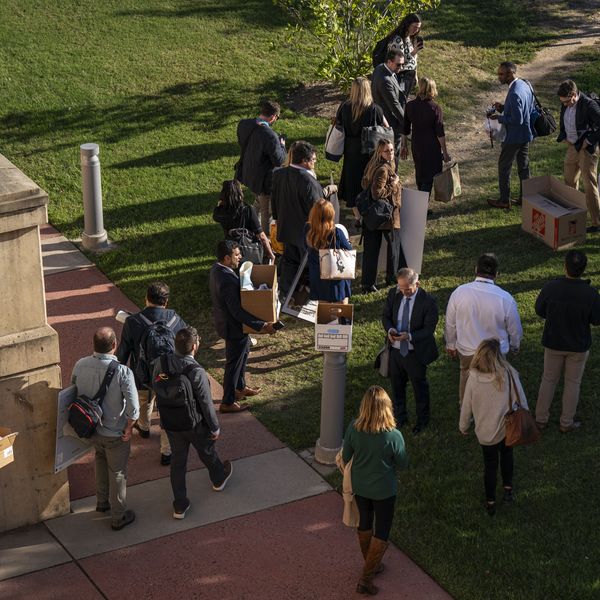Another day, another huge media merger. This time it's the Tribune Co. swallowing up Times Mirror -- uniting two firms best known for their powerhouse daily newspapers, the Chicago Tribune and the Los Angeles Times. The combined media holdings include other big dailies along with plenty of mass-circulation magazines and television stations.
The new giant Tribune Co. will become the country's third-largest newspaper chain -- publishing papers with daily circulation of 3.6 million -- behind only Gannett and Knight Ridder. In addition to putting 11 daily papers under one corporate roof, the new conglomerate will combine the Tribune's current ownership of 22 major TV stations with a range of Times Mirror magazines that claim more than 60 million readers.
For journalists at the Los Angeles Times, the mood has been downbeat for years now. In 1995, corporate parent Times Mirror brought in a CEO, Mark Willes, who had been a whiz at General Mills. He promptly compared selling newspapers to peddling boxes of cereal.
Willes moved quickly to swing a wrecking ball at the walls between the news and advertising departments. Business execs were assigned to each section of the newspaper to collaborate with editors in shaping editorial content. The message was clear: To be fine, journalism must help boost the bottom line.
With such an approach, it's no surprise that Times Mirror initiated the negotiations with the Tribune Co. that led to the $6.46 billion deal. The Chandler family, holding most of the Times Mirror voting shares, was eager to cash out.
There's no doubt that the drive of media conglomerates toward monopolization is depleting the civic value of newspapers. But let's not romanticize the fading spirit of the newspaper industry. For a long time, demographic dollars have been pivotal.
"Most metropolitan newspapers do not cater to the working public within their cities," Chicago mayor Harold Washington observed in 1986, shortly before his death. "They reach out to the suburbs to embrace a more affluent readership." Since then, the situation Mayor Washington described has gotten worse: "These papers are still based in our cities, they own city property and to a great extent they control our cities. But newspapers largely ignore the people right around them."
Preoccupied with demographics, most media owners are fixated on the viewers, listeners and readers with higher incomes. Like broadcasters, top editors at daily papers often find themselves under pressure to attract the kind of upscale audience valued by advertisers.
This quest leaves many city dwellers in the lurch. The trend at many news outlets is to gloss over the day-to-day experiences of living in a city, as distinct from merely working or unwinding there. Early in the 1990s, an outspoken editor at USA Today, Barbara Reynolds, described the news media's "rule of thumb for covering cities" this way: "Ho-hum, they're still poor -- old story, no news." (A few years ago, USA Today fired Reynolds.)
In national news media, the cities gain positive importance primarily to the extent that they're being "revitalized" with investments that bring affluent people back into urban centers. But the poor and moderate-income people who inhabit urban centers are under-reported -- unless, of course, they can serve as characters in stories about violent crime or stigmatized social programs such as welfare.
"Freedom of the press is guaranteed only to those who own one," media critic A.J. Liebling commented several decades ago. In the New Media environment, that basic axiom is no less true -- despite all the assurances to the contrary.
Powerful media executives now herald joy to the world via a seamless web of media. Along the way, we're not supposed to worry much about democracy. On January 12, two days after the announcement of the merger between America Online and Time Warner, the AOL chief Steve Case assured a national PBS television audience: "Nobody's going to control anything." Seated next to him, Time Warner's chief Gerald Levin declared: "This company is going to operate in the public interest."
But to an unprecedented extent, large numbers of American reporters and editors now work for just a few huge corporate employers -- a situation that hardly encourages unconstrained scrutiny of media conglomerates as they assume unparalleled importance in public life. The mergers put a lot more journalists on the payrolls of media institutions that are very newsworthy as major economic and social forces.
Many of us grew up with tales of journalistic courage dating back to Colonial days. John Peter Zenger's ability to challenge the British Crown with unyielding articles drew strength from the fact that he was a printer and publisher. Writing in The New York Weekly, a periodical burned several times by the public hangman, Zenger asserted in November 1733: "The loss of liberty in general would soon follow the suppression of the liberty of the press; for it is an essential branch of liberty, so perhaps it is the best preservative of the whole."
In contrast to state censorship, which is usually easy to recognize, self-censorship by journalists tends to be obscured. It is particularly murky and insidious in the emerging media environment, with routine pressures to defer to employers that have massive industry clout and global reach. We might wonder how Zenger would fare in most of today's media workplaces -- especially if he chose to denounce as excessive the power of the conglomerate providing his paycheck.
Americans are inclined to quickly spot and automatically distrust government efforts to impose prior restraint. But what about the implicit constraints imposed by the hierarchies of enormous media corporations -- and internalized by employees before overt conflicts develop?
"If liberty means anything at all," George Orwell wrote, "it means the right to tell people what they do not want to hear." As immense communications firms increasingly dominate our society, how practical will it be for journalists to tell their bosses -- and the public -- what media tycoons do not want to hear about the concentration of power in few corporate hands?


